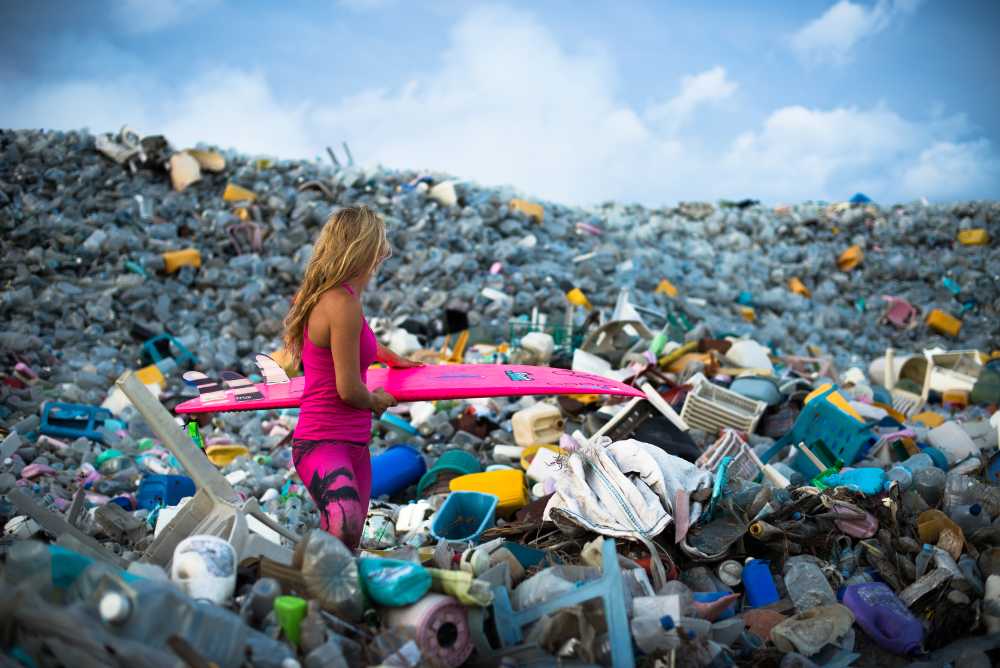
Alison’s Adventures Maldives “One man’s trash is another woman’s bikini”While shooting Discover Channel’s #1 show Naked and Afraid in the Maldives, I was overwhelmingly shocked by the amount of plastic trash covering the uninhabited, picturesque island. This was only one island - I couldn’t bear to imagine what the other 1,200 islands looked like, covered in trash. To leave the island we actually made a raft out of bottles. As we paddled to our rescue boat, I swore I would come back and do something about the plastic pollution.After returning from “everest of survival challenges” living with NOTHING for 21 days, I devoured a chocolate bar, took a much needed shower and my first thought was: How can I help transform plastic waste around the world into usable items? The scariest thought was that only a portion of the plastic trash was coming from the inhabited islands, it was also coming to the island chain from other countries brought by the ocean currents.Over a year later I retuned to the Maldives, hosted by Shaahina Ali and accompanied by photographers/videographers Sarah Lee and Mark Tipple. Together we set off on a wild adventure back to “my island” wearing all clothing made from recycled plastic bottles from a company called Repreve that transforms plastic into usable thread for world renowned brands like Patagonia, Odina, Teeki, Volcom, and Roxy - and of course my surfboards are Sustainable Surf approved Eco Board made from recycled styrofoam and sunglasses from Zeal Optics.An international icon of natural beauty, my experience in the Maldives presents an opportunity to tell a crucial story about plastic waste and recycling that fits into my “Surf Survive Sustain” mission, of living a non-invasive existence as environmentally responsible as possible.While there, I collected trash in an effort save the highly threatened biosphere (insert manta photo) and then retuned to my Naked and Afraid island to do a beach clean up with a team of amazing volunteers. In only a half hour, covering about 50 feet of beach we gathered all the bottles in this photo below and the villagers took great pride in making sure I was no longer “naked” but “clothed” in plastic fashion.All trash collected in the Maldives is taken to “Trash Island”, or Thilafushi, an island landfill made entirely of waste that stands as a sort of eerie, beautiful apocalyptic art piece. Instead of looking at this wasteland as horrific, I see it as an opportunity to make a lot of pink bikinis!I would love to see plastic disappear from this world all together - particularly single use plastic such as bottles, straws, and plastic bags, but in the meantime, I would rather see it in bikinis, jackets, and eyewear than strewn across the beautiful beaches of the Maldives, and other beaches around the world - with bottles that have drifted all the way from US!We have the power to change the world with every item we purchase!Alison’s Adventures Maldives film will be released in 2015…stayed tuned!
Plastica sotto accusa e nuove riforme in arrivo entro il 2021. Definitiva la scelta attuata dall’Unione Europea ed è guerra aperta contro i prodotti in plastica di uso quotidiano.
Da tempo si parla di inquinamento, rifiuti, effetto serra. Il danno che questo provoca ai biomi naturali e all’ecosistema mondiale è immane. L’obiettivo a lungo termine che si è posto il Parlamento Europeo è quello di prendere atto delle proprie azioni per limitare i costi stratosferici (22 miliardi) che lo smaltimento dei rifiuti comporta e salvaguardare quel poco che rimane da salvare.
Numerose riforme sono state approvate in attesa della pubblicazione prevista entro i prossimi anni. Il PE ha pertanto dato conferma della completa rimozione delle materie plastiche dal mercato, con una rigorosissima applicazione del principio “chi inquina paga”, estesa in modo particolare a fumatori e a coloro che praticano pesca, responsabili di immettere nell’ambiente rifiuti quali filtri di plastica, lenze e ami da pesca con il conseguente pagamento di una multa.
Ciò che aggrava la situazione in modo esponenziale è l’inquinamento marino. L’80% dei rifiuti inquina i mari di tutto il globo, una cifra considerevole se si prende atto che il pianeta è coperto per il 71% d’acqua. Una parte di questi rifiuti marini sono poi ingeriti da pesci e molluschi che finiscono nei piatti che si consumano, provocando malori se non patologie più gravi agli esseri umani.
Non è dunque una questione da prendere sotto gamba. Inizialmente la plastica era vista come una rivoluzione, utilizzabile in tutti i campi, dal costo basso e facile da produrre. Tuttavia come ogni cosa che l’uomo produce ne perde poi il controllo. Quindi la domanda da porci è: << Siamo in tempo per rimediare? >>
Vittorio Senzio
Maria Francesca Capozzi Lauro
